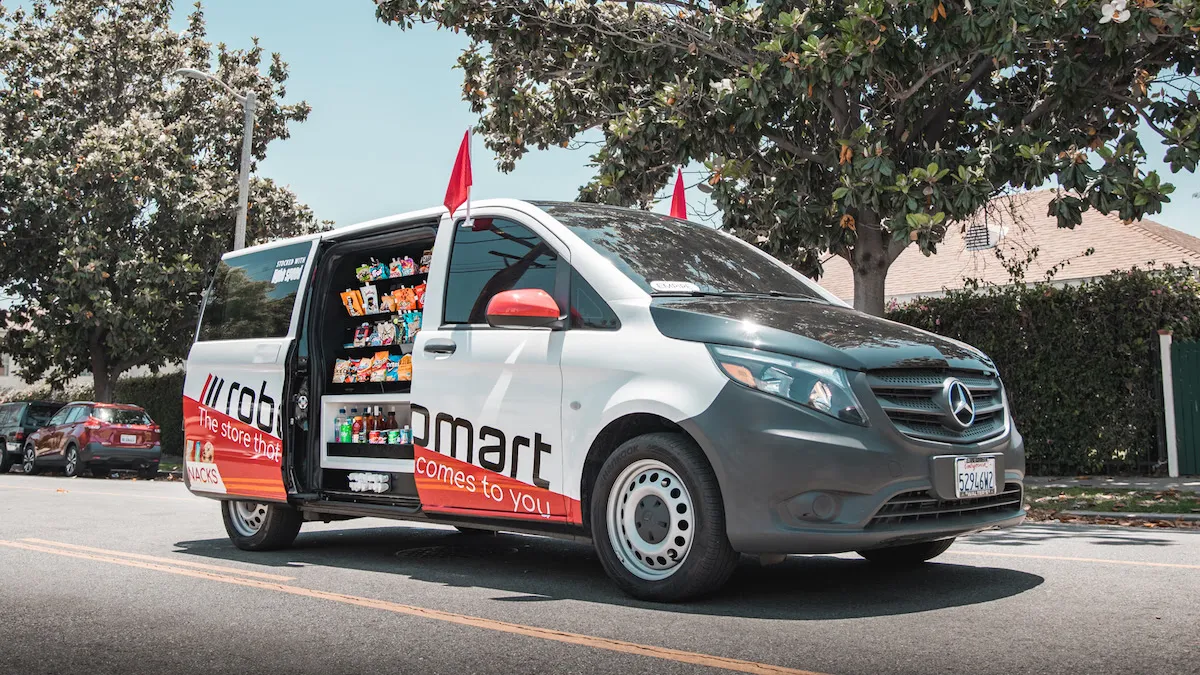Dive Brief:
- Store-hailing startup Robomart has launched a platform for retailers that promises to deploy branded grocery, convenience and fast-food outlets on wheels in 2022.
- The platform will debut in the Greater Los Angeles area, where companies can choose from any of six store types that consumers hail using their mobile phones, according to an emailed announcement. Retailers will select what they want to sell and where, while Robomart handles stocking and product management.
- The expansion comes as instant delivery companies are upping the ante on speed of service as they expand across the U.S.
Dive Insight:
Coming on the heels of Kroger and Instacart’s virtual convenience store rollout, Robomart is betting other grocery retailers are angling to join the instant-needs delivery trend.
The startup, which launched commercially this summer in West Hollywood, California, is offering a way for retailers to plug into a hyper-local service that boasts speedy delivery times and a curated assortment of goods. What’s unique about Robomart is that it brings the store to the shopper, allowing them to select goods once the vehicle arrives and then charging them through its RFID-based, checkout-free system.
Robomart vans each carry around 500 packs of 50 everyday products that are regularly monitored and replenished. The company has clocked a full delivery experience, from hailing the store to having goods in hand, in just under two minutes and said the average engagement time is around nine minutes. Prices are competitive with surrounding stores, and shoppers don’t have to meet an order minimum, though they are charged a “hailing fee.”
Robomart’s vans each carry a channel-specific assortment. The company launched mobile pharmacy and snacks units in June and will also have grocery and cafe vans ready to deploy with retailer partners in early 2022. Ice cream and fast food Robomarts are currently in development and will be available in late 2022.
Letting consumers browse through product selections in-person instead of through an app or webpage could drive up ticket sizes. But it remains to be seen whether or not this new shopping mode will become a regular habit for consumers. Does a significant number of digitally savvy, speed-loving consumers also prize the experience of seeing and selecting their own goods?
In terms of partnership specifics, Robomart says retailers decide which products to sell, set their pricing and vehicle branding and then pick their service zones — in this case within the Greater Los Angeles area. They also have access to a dashboard that reports sales data and analytics. Robomart manages product stocking, tagging, scanning, quality control and replenishment.
In addition to its retail platform launch, Robomart said it will roll out more mobile stores in partnership with Reef, a leading operator of micro-distribution centers and neighborhood kitchens that helped launch the commercial run this summer.
Robomart unveiled its mobile stores nearly three years ago with the promise that they would run autonomously. But the company ran into issues putting self-driving vehicles on Boston’s streets in partnership with Stop & Shop. Currently, Robomart vans have drivers, and the company said this summer it plans to roll out fully autonomous vehicles “as regulations allow."













